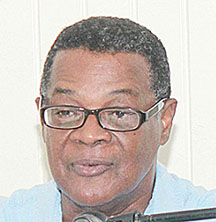Dissatisfaction in the mining industry over what is felt to be disproportionate official interest in the welfare of the sector and of miners when account is taken of the extent of the industry’s contribution to the country’s economy, is—not for the first time—being publicly expressed by President of the Guyana Gold and Diamond Miners Association (GGDMA) Patrick Harding.
At the Thursday April 30, Membership Meeting of the association, Harding used his presentation to hone in on hinterland crime and the impact which it continues to have on the security of the sector. The mining industry official focused much of his address on the litany of illegal activities that have become commonplace in mining areas including, “the increase in… violence, murders, trafficking in persons, drugs and other illegal activities.”

And in a thinly veiled charge that some public officials are part of the problem rather than being part of the solution, Harding declared: “It seems that the backdams are being managed by mines officers, rangers and police who set out to enrich themselves.”
According to Harding, the proliferation of illegal firearms and drugs in mining areas has meant that the Guyana Geology and Mines Commission (GGMC) is afraid to send unarmed mines officers into the interior, a circumstance that leaves claim holders at the mercy of bandits. “Only the claim holder with a security force with bigger guns can survive,” Harding told the meeting, adding that miners had informed him that in order to secure approval for firearm licences they were required to provide financial statements, VAT registration and several other forms of documentation and that these requirements might well encourage some miners to “bypass” the system.
Harding said discussions with GGMC and the Guyana Revenue Authority (GRA) on the issuances of shop licences and selling of alcohol beverages without permits have borne no real fruit, nor, it seems, have meetings with officers of the Guyana Police Force. Those meetings have also broached the subject of the establishment of additional police outposts at specific locations, the need for more mobile patrols and “surprise/clean up visits to troublesome locations,” he said.
And in order to help tackle the serious security problems in mining areas Harding said that the GGDMA was throwing its weight behind efforts to have applications for firearm licenses expedited in order to fast-track approval for larger miners or mining companies wishing to create their own security services in order to facilitate “a system of continuous roving patrols,” as well as “a shared communication system … especially since new mining lands are being opened up or extended.”
Harding said the GGDMA had met with Commissioner of Police Seelall Persaud and he had promised to support the miners by expediting the issuance.
All of this, Harding said, was taking place against the backdrop of the mining sector being the country’s largest foreign exchange earner, providing jobs for skilled, semi-skilled and unskilled workers.
Harding said that gold mining provided jobs “directly” for about 16,000 persons and indirectly for between 120,000 and 150,000, many at interior locations “where there are few government or private sector job opportunities.
The GGDMA President also alluded to the importance of the mining sector to several other industries including heavy-duty equipment companies, domestic airlines and transportation services, spare parts and service companies. Mining, Harding said, had contributed to various facets of infrastructural development including hinterland roads and airstrips, bridges, and landings. Miners have built shops and hotels and installed electrical and communication services, he added.
Harding also alluded to efforts being made by the miners to have the royalties paid to government reduced from the current 5 per cent which, according to the GGDMA President, is “one of the highest in the world.” Noting that miners in neighbouring Suriname pay 4 per cent, Harding said the GGDMA has petitioned the government to reduce royalty payment to 3% once the price of gold is under US$1,400/ounce and for this to be done on a sliding scale so that whenever the price of gold goes over US$1,400/ounce, the royalty payments will increase proportionately. He said the association was awaiting a response from government on this recommendation.





